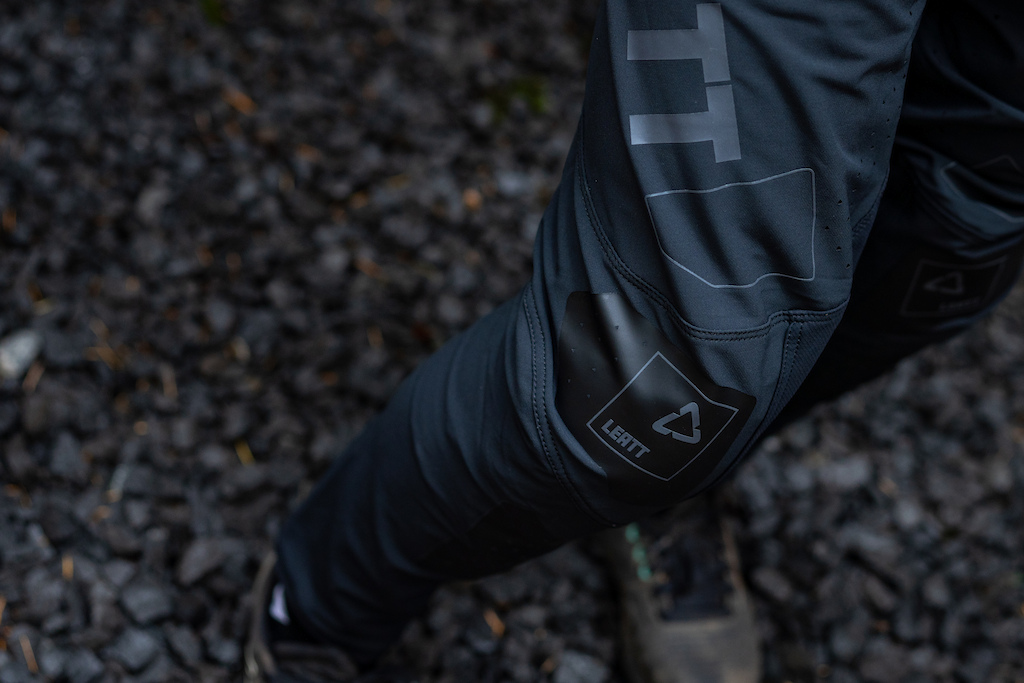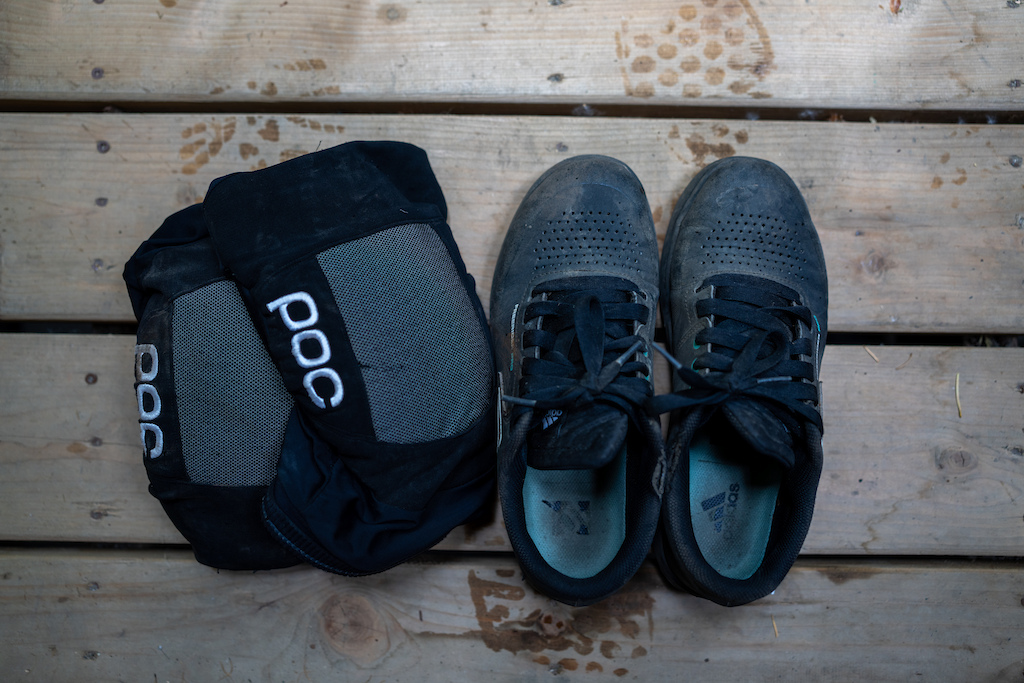Downhill helmets and pads have come a long way in terms of comfort, safety and in some cases fit, but it’s also in some ways one of the more conservative areas of design. Where as enduro protection has morphed from deep-trail helmets, to detachable chin guards and now the modern light weight full face, downhill helmets have arguably seen a process of refinement more than revolution. Similar could be said of knee pads, which have got more secure and in some cases sleeker or more comfortable, without perhaps seeing the massive overhauls in technologies that we saw around ten years ago with the advent of materials and technologies such as D30.
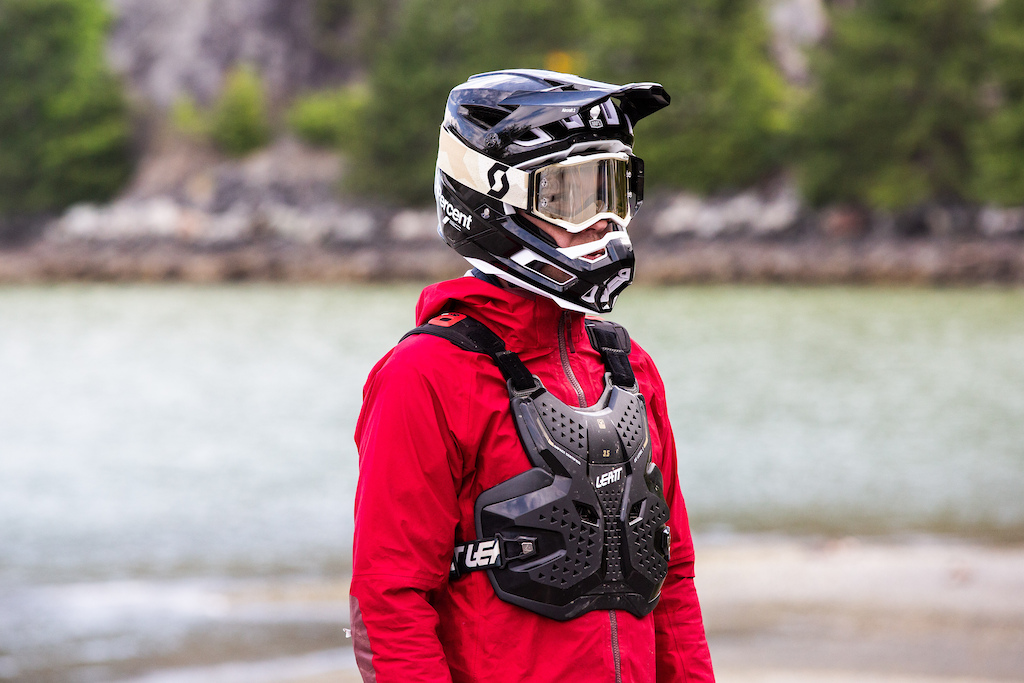
Position: Tech Editor & Kettle Supervisor
Favourite type of trail: Fast tech and rough chatter
Chosen Protection (USD): 100% Aircraft 2 ($400), Leatt 3.5 Chest Protector ($149.99), Scott Prospect Goggles ($104.99), 7iDP Sam Hill Knee Pads ($94.99)
I like the Aircraft 2 helmet a lot. It feels like a great blend of ventilation, without going too far and becoming too light or enduro. It feels sturdy and whilst the way we review helmets is inherently subjective, it just fits my head well. Sometimes, I find that to get a helmet to fit I have to go to the huge XL or even XXL sizes, and quite frankly it looks and feels absurd. With the Aircraft 2, however, I was able to achieve a great fit in a large by just changing the pads.
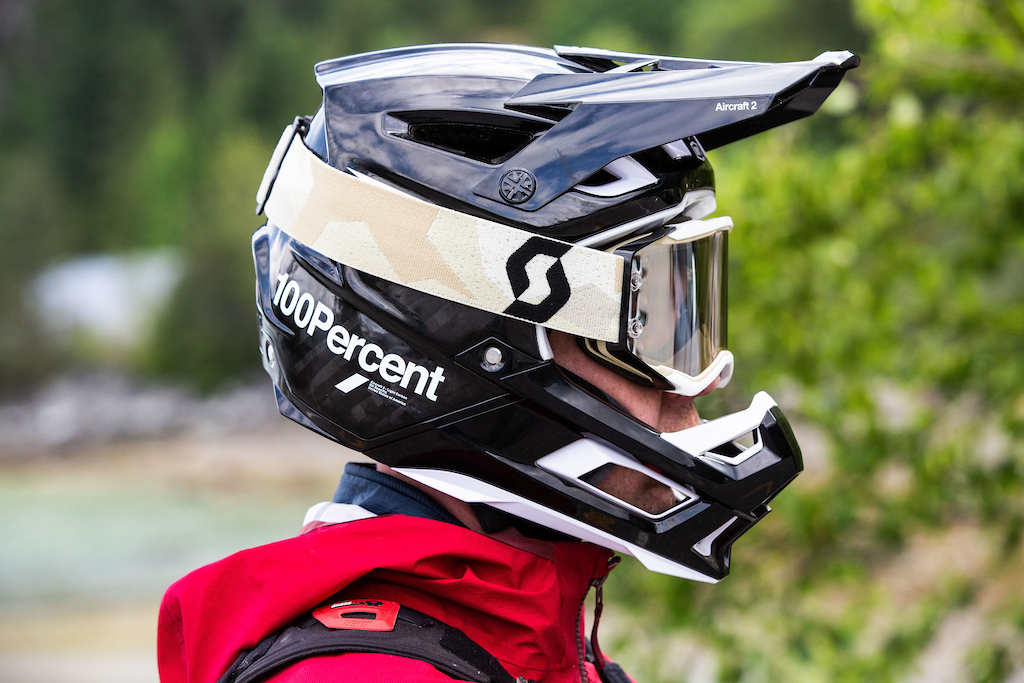
When you are pushing on a hot day I would say it is noticeably better ventilated than other full-face helmets that I’ve ridden in. Yes, it can be warm in there, as with any full face, but by comparison, it does do a good job.
I like the Scott Prospect goggles for their huge field of vision. I don’t like looking through goggles and feel like your seeing the world in a super-widescreen ration, as the top of your vision is obscured. Yes, you get used to it, but I like the Prospects because they don’t suffer from this at all. I use a silver lens, which isn’t particularly dark and works reasonably well in patchy light. I do sometimes swap it out for a light one though if the conditions warrant it, which is easy enough.
I really like the Sam Hill pads when using them for a review. They manage to include lots of things I want in a pad – flexible enough to pedal, plenty of firm protection over the knee cap and decent coverage. They are slightly bulkier than some other pads, but for the protection they offer, I would say they’re very reasonable.
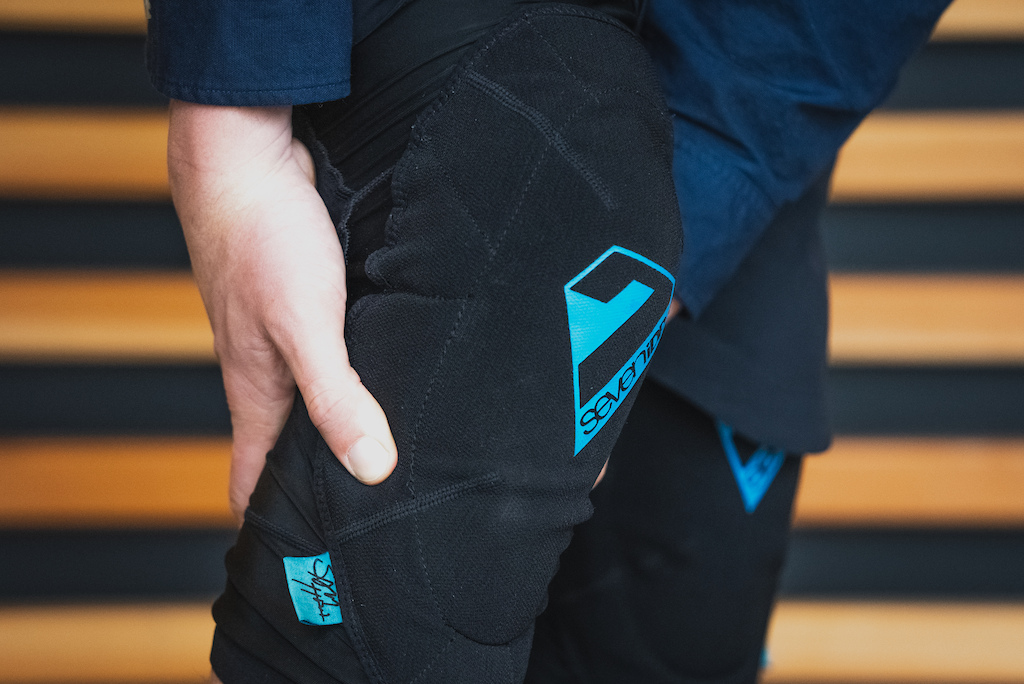
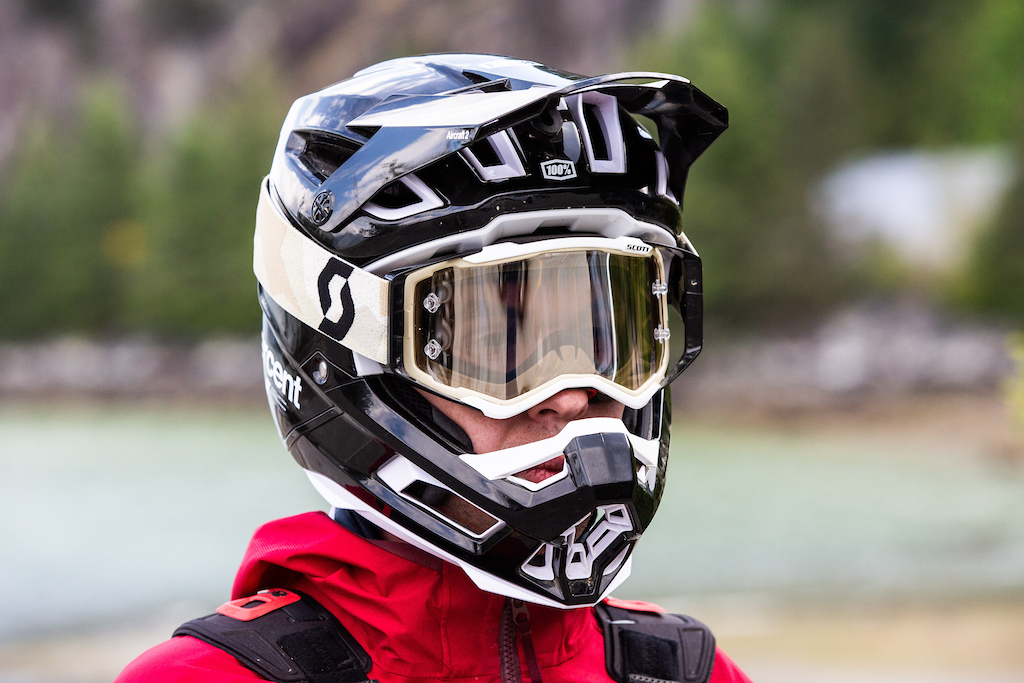
The roost-guard I use is the Leatt 3.5 Chest Protector. Honestly, I always thought this style of protection was a bit in-your-face, and previously I thought it was kinda dumb. Maybe I’m mellowing in my age, or maybe just becoming more pretentious, either way – I’ve been using it a lot and I’ve really began to like it. This is for three main reasons – it’s more safe than not having it, it’s light and unrestricting and finally when wearing it on the outside, it’s very easy to unclip and vent on the chairlift or hot-sticky gondola cabin on the way back up.
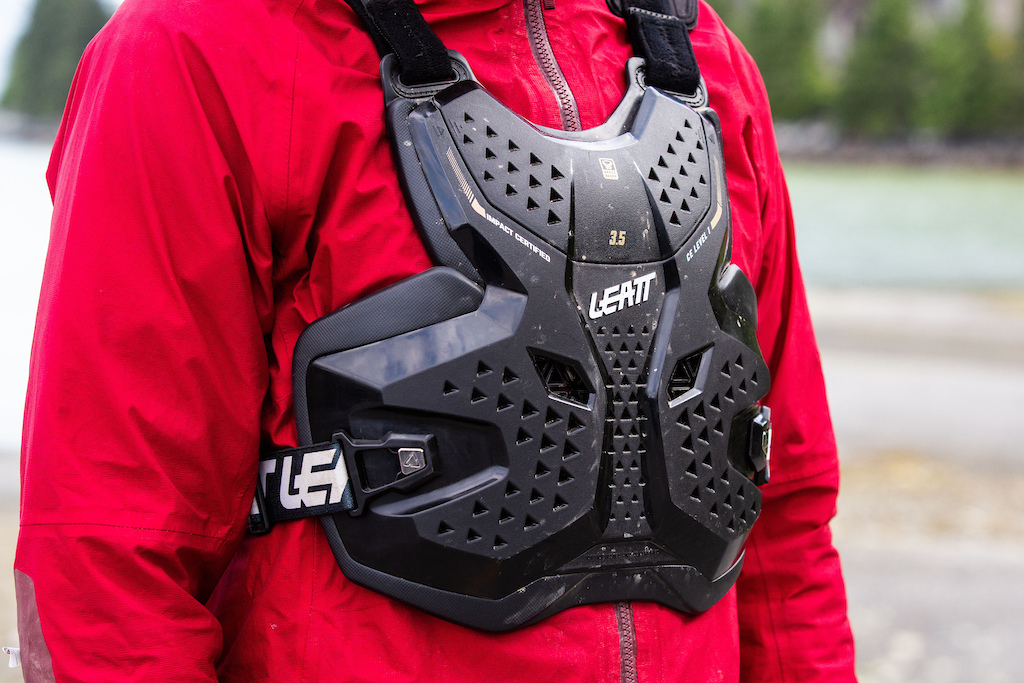
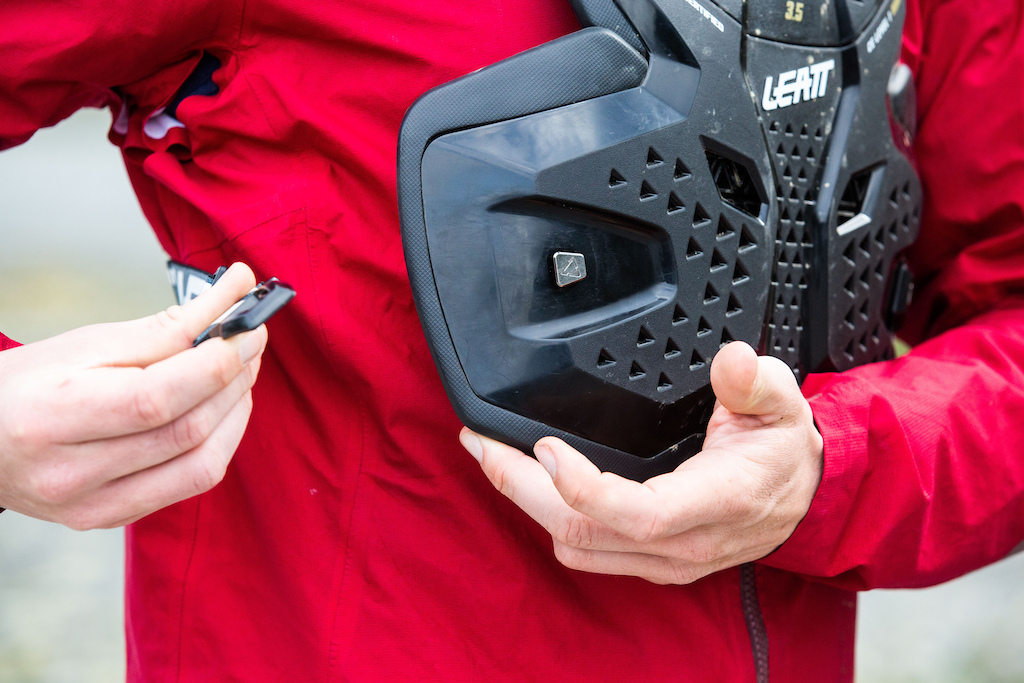
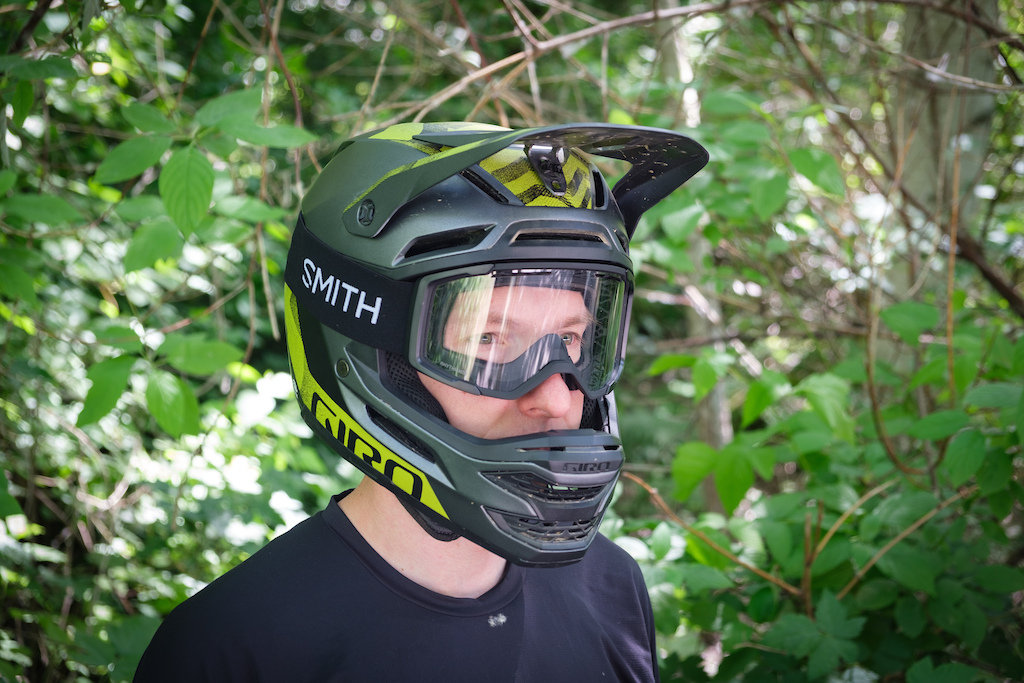
Along with the pure entertainment factor of being whisked to the top of a mountain and then being able to chose from a wide variety of trails, it’s also an incredibly efficient zone for product testing – there aren’t too many places in the world that are better suited to bike, suspension, and wheel smashing. My preferred lap runs the gamut from the blown out chunkiness of Goat’s Gully to the the fun and floaty jumps on A-Line and Dirt Merchant – it all just depends on my mood.
Position: Managing Tech Editor, nap aficionado
Favorite type of trail: Pretty much all of them.
Chosen Protection (USD): Giro Insurgent helmet ($350), Smith Rhythm goggles ($80), iXS Carve Race knee pads ($130), Fox Baseframe Pro sleeveless back protector ($190)
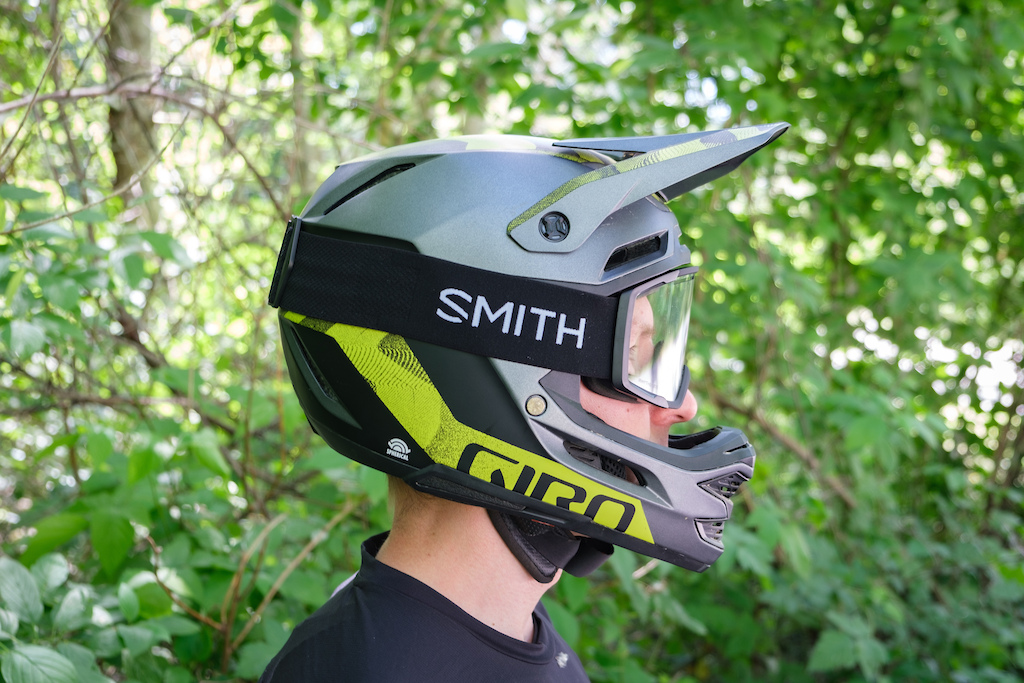
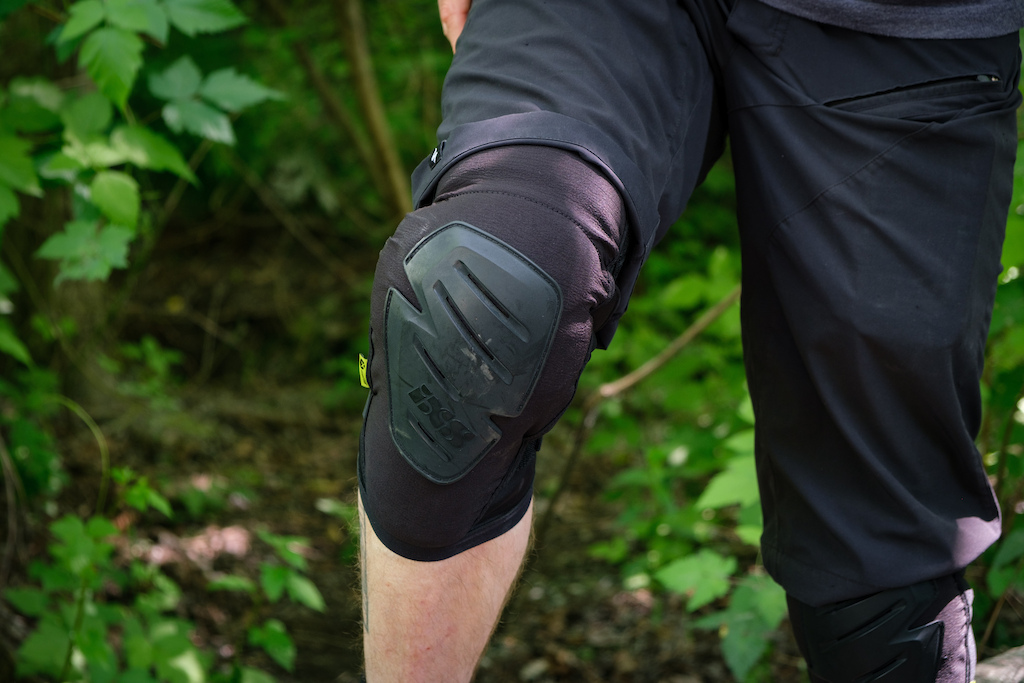
The full-face helmet I’ve been wearing the most lately is the Giro Insurgent, mainly due to the very comfortable fit. It’s also nice and quiet, free of any annoying plastic creaks or squeaks. It weighs a reasonable 1053 grams, and has the ‘just right’ feel I’m looking for in a DH-oriented helmet – it doesn’t feel like I’ve strapped a bowling ball to my head, and it also doesn’t feel it’ll disintegrate during a small tip over. It’s decently ventilated too, although that factor’s not as high on my priority list, since I take my helmet off at the end of every lap.
For goggles, I always run clear lenses, and ideally chose a pair with a wide field of vision – I don’t like seeing the top or edges of the goggle frame while I’m riding. Smith’s new Rhythm goggles have been doing the trick this season – they fit well with my helmet, and the wide strap keeps them securely in place.
I typically go with a slightly burlier knee guard when I’m riding in the bike park compared to what I’d wear on a more pedally ride. The speeds are higher, which means the impact force is going to be greater if I do make a mistake and end up sliding around in the dirt. iXS’s Carve Race knee pads have a viscoelastic foam inner pad, with a harder plastic shell on the outside. I typically wear pants unless it’s a million degrees out, but in theory that plastic shell should slide better on the ground, and adds some extra durability. There’s also additional foam padding at the sides and the top of the knee for even more protection. The silicone strip at the top of the pads does occasionally irritate my skin – in an ideal world, the pads would have a taller cuff and use dots of silicone rather than one solid strip.
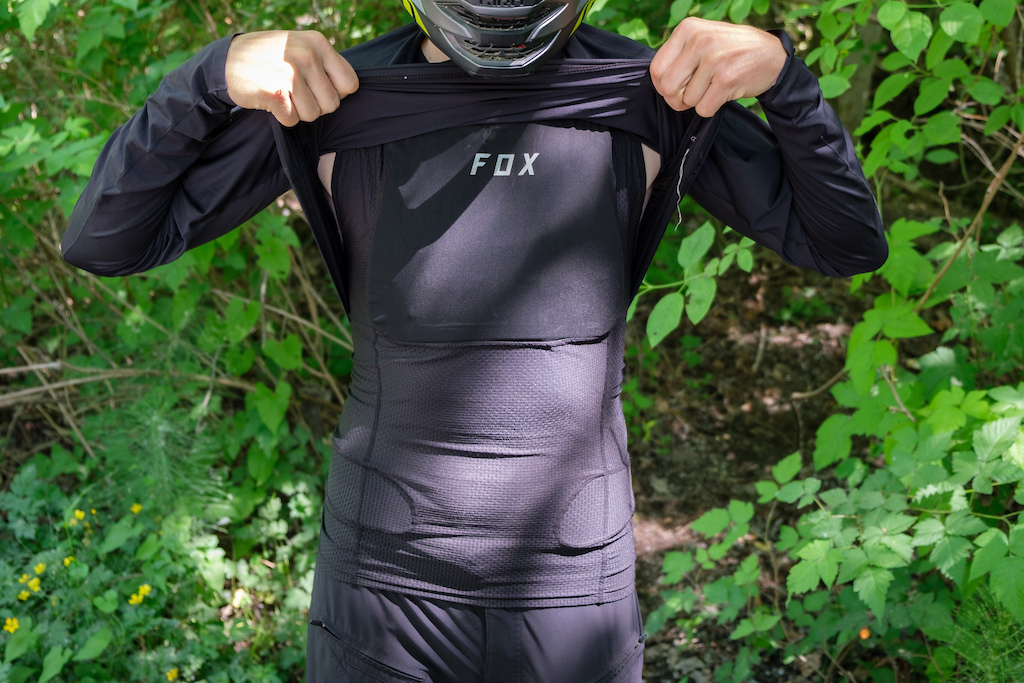
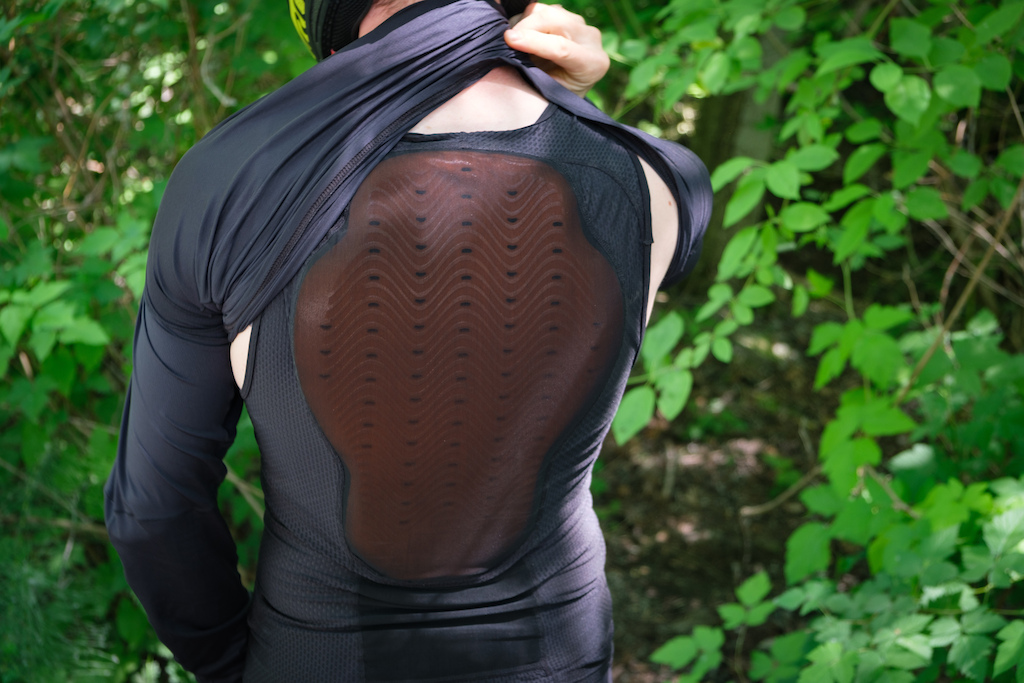
It took me a while, but I finally found a back protector that I don’t mind wearing all day long – Fox’s Baseframe Pro Sleeveless Chest Guard. It’s essentially a lightweight tank-top with a removable D30 back protector housed in a sleeve on the back. There’s also a foam chest protector, and a small bit of foam padding at the hips. It easily fits under a jersey or a t-shirt, and it’s not bulky or uncomfortable in the slightest. I already have some titanium souvenirs in my spine, and I don’t want any more, so I figure a little extra protection is a good idea.
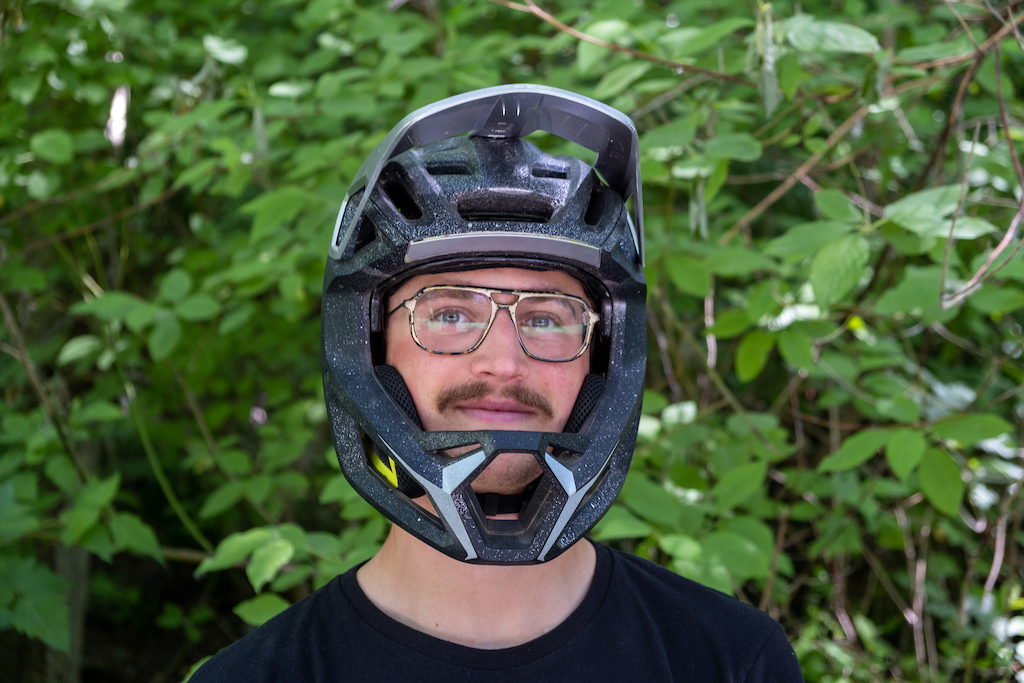
Position: Tech Editor, local kook
Favorite type of trail: Love it all, but tech has my heart.
Chosen Protection (USD): Fox Proframe RS Sumyt ($360), iXS Trigger Race knee pads ($160), EyeBuyDirect Glasses ($25), Safety Squint ($Free)
Before you freak out about the glasses – I know. Contacts are key for me, and some weird new prescription needs has me searching for a pair that actually stay in place over the course of a rough run, so hopefully soon I can be back in the land of protected eyes. For now, I’m just another kook on the hill, rocking the biggest pair of glasses I could get my hands on. Maybe it’s the start of a trend, who knows.
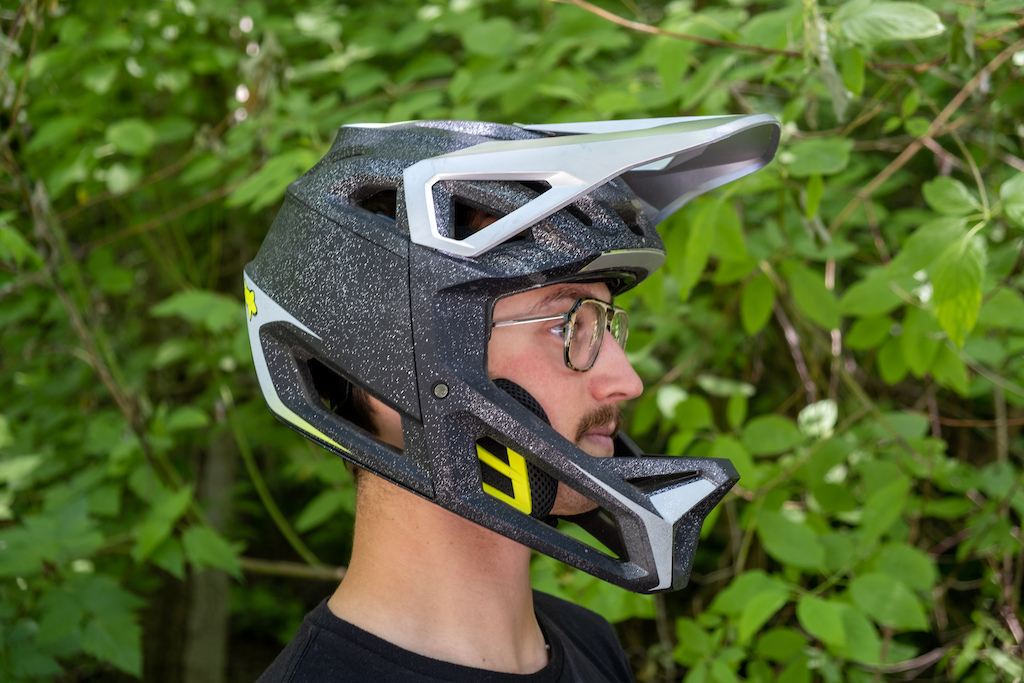
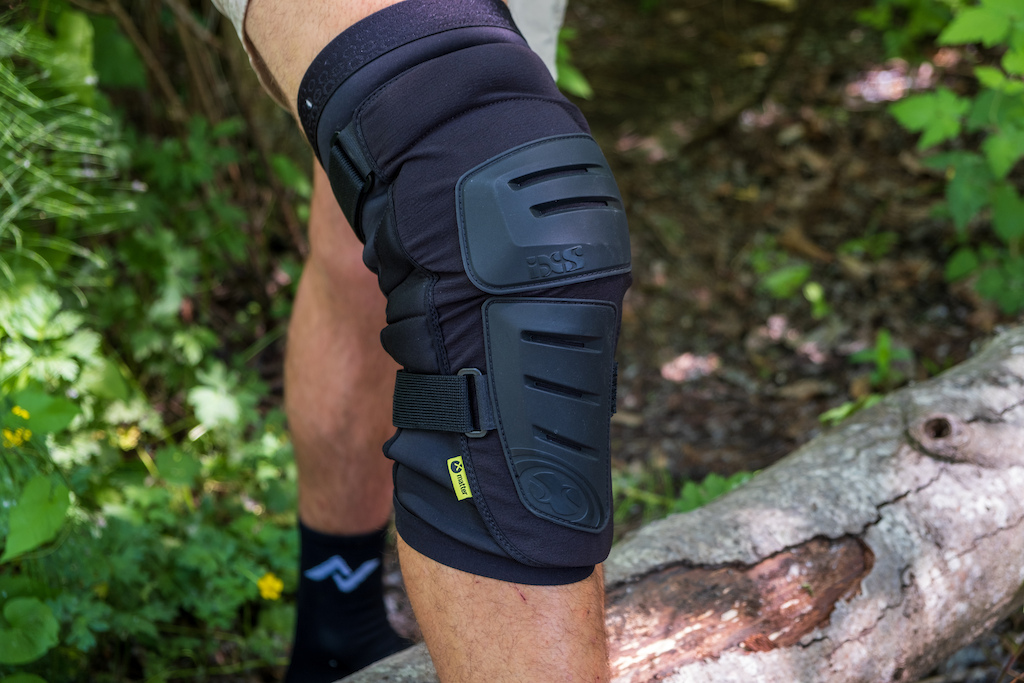
At the moment, I’m rocking the Fox Proframe RS Sumyt helmet in the park, despite it being more of an all-mountain piece of protection. It is DH rated, with a whole host of certifications, and the spherical Mips system has proven to be very effective on other helmets I’ve tested, so I feel confidant in the protection it offers. The upside to the lighter construction, besides the 820g overall weight, is the amount of airflow you get around your head, which makes busting out as many laps as possible just a little bit more comfortable. My one complaint with this helmet is the squeaking that comes from the contact between the two slip-plane layers in the shell. You don’t really notice it at speed, but when things are slower and quieter, it can be quite irritating.
Goggles, how I miss thee. These EyeBuyDirect glasses (called the Intrepid should you want to cop my look) are massive, so they do offer pretty decent protection from dust and debris – but they’re no replacement for the real thing. The one upside to this absurd look is I do get a ton of air through the front of the helmet, keeping things cool.
Similar to Kaz, I tend towards the burlier knee guards when I’m in the park, because why not. These iXS Triggers are about as beefy as I’m willing to wear, but they remain comfortable over a day of riding, even when temps are high. The silicone can be irritating after a few hours, but it’s pretty much the only reminder that I have them on. Thanks to the full-knee coverage and hard plastic, I don’t really worry about any sort of tipover, and can use the pads as a soft catch in case that does happen.
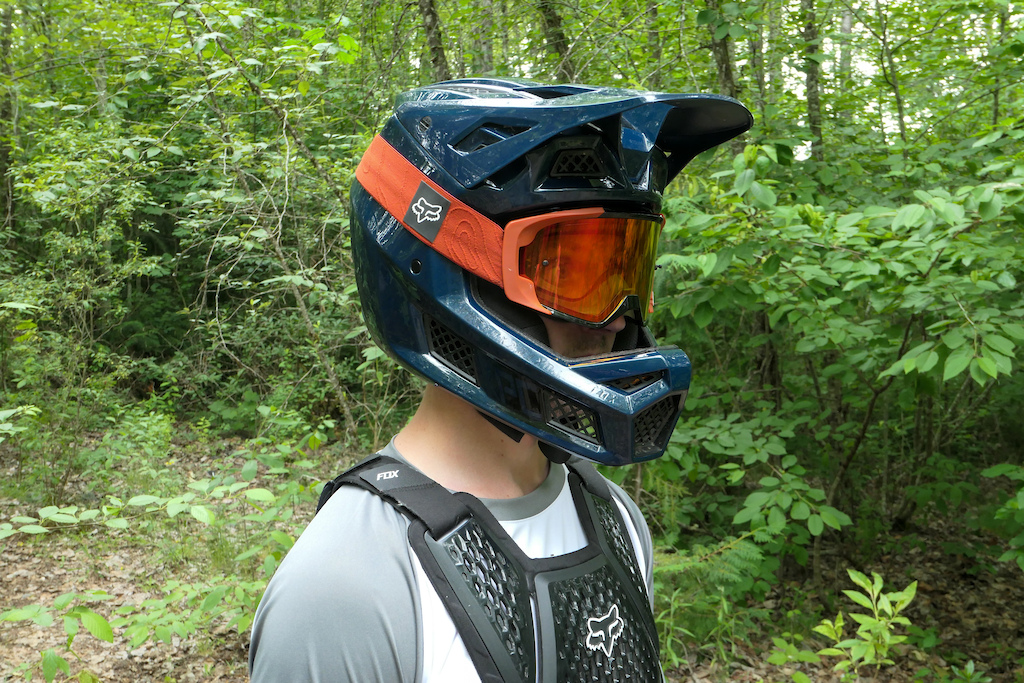
Lately, I’ve added in elbow pads for the same reason – there’s not much cushion between your funny bone and the rock-hard berms of Aline and the like, which is where I end up spending the most time, even though I primarily ride a downhill bike in the park.
Position: Tech Editor & neck tan specialist
Favourite type of trail: High-speed tech, aka the bike workout.
Chosen Protection (USD): Fox RPC helmet ($500 USD), Fox Vue goggles ($134.95 USD), Fox Raceframe Impact D3O Back Chest Guard ($189.95 USD) POC Joint VPD 2.0 Knee Long pads ($160 USD), Racer Mountain Elbow pads (€69 EUR), Leatt 4.0 Lite gloves ($69.99 USD)
As the summer progresses and the upper trails around Whistler open up, I’ll trim a few layers and drag an enduro bike into the park for testing and turn to the more technical, nature trails. If the ride is lift-assisted, I’ll still reach for the full-face helmet but I might resort to one of the lighter, heavily vented options out there. With that said, should the laps take me to those fast, machine-made trails, I try to town down the intensity and lower the chance of hitting the deck.
For the most part, my gear of choice would be a Fox RPC helmet and Vue goggles with a lens that locks into the frame – I’ve seen scary incidents with lenses popping out in seemingly innocent crashes. The RPC helmet is on the larger side, in terms of volume, but the variable-density foams inside have convinced me that they offer superior protection.
When it comes to knee pads, I look for ones with a plastic cup in addition to an impact-absorbing material. Fox’s Launch Pro D30 would be the go-to if there might be any uphill segments involved in the ride. Otherwise, I love the coverage and robustness of POC’s VPD 2.0 Knee Long, …long knee pad.
Racer is a seldom-seen company on this side of the pond offering quality protection goods. Surprisingly, their thick elbow pads are quite flexible and haven’t caused increased arm fatigue – something I’ve found with other equipment in this area. They won’t deter broken limbs, but they will take the sting, and stick, off of road rash.

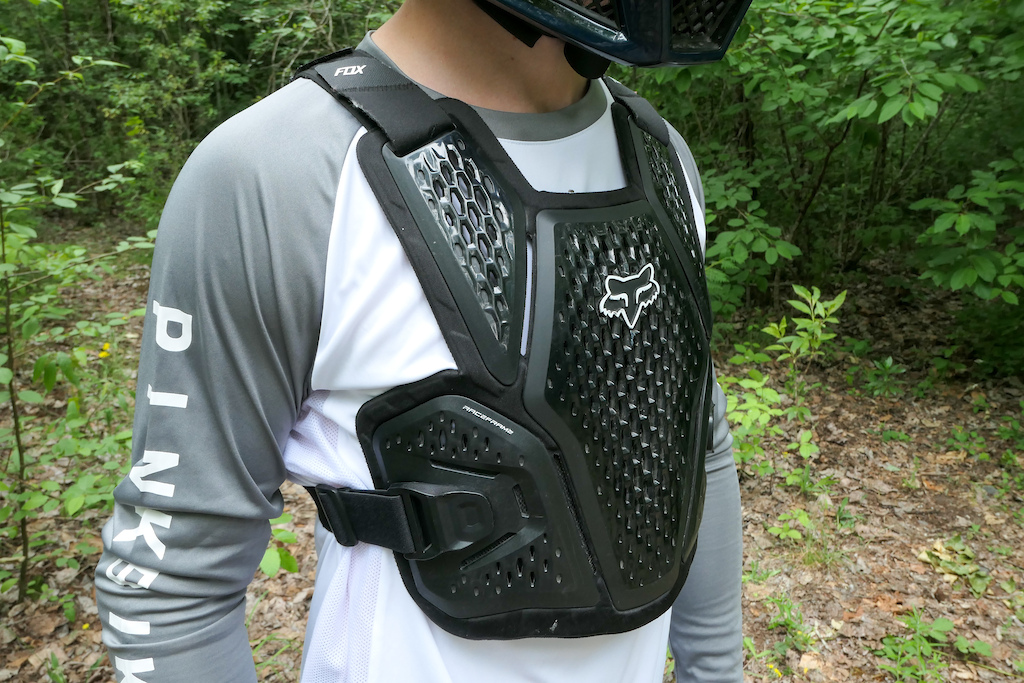
Another key piece of protection I’ve been wearing in the bike park for a decade now is a roost guard, or whatever you want to call it. The Fox Raceframe Impact D3O Back Chest Guard describes what it does best and like the elbow pads, it won’t stop fractures, but it will deter pointy rocks from stabbing your ribs or bumping your spine. I tend to wear this item over my jersey in the cooler months to avoid chafing any sensitive areas and underneath in the summer to increase airflow.
On occasion, I’ll skimp on gloves for a casual pedal or big mountain mission, however, they are a must-have for me in the bike park. I’ve found that they add a level of grip over sweaty palms or rainy grips and hold the bars with less force, therefore avoiding hand fatigue. One extra layer to shield your palms against high-speed sandpaper doesn’t seem like a terrible idea to me either. Exterior protection on gloves isn’t totally necessary to my choices yet I’m happy to have these on when I get whipped by a lingering alder branch or fence marker.
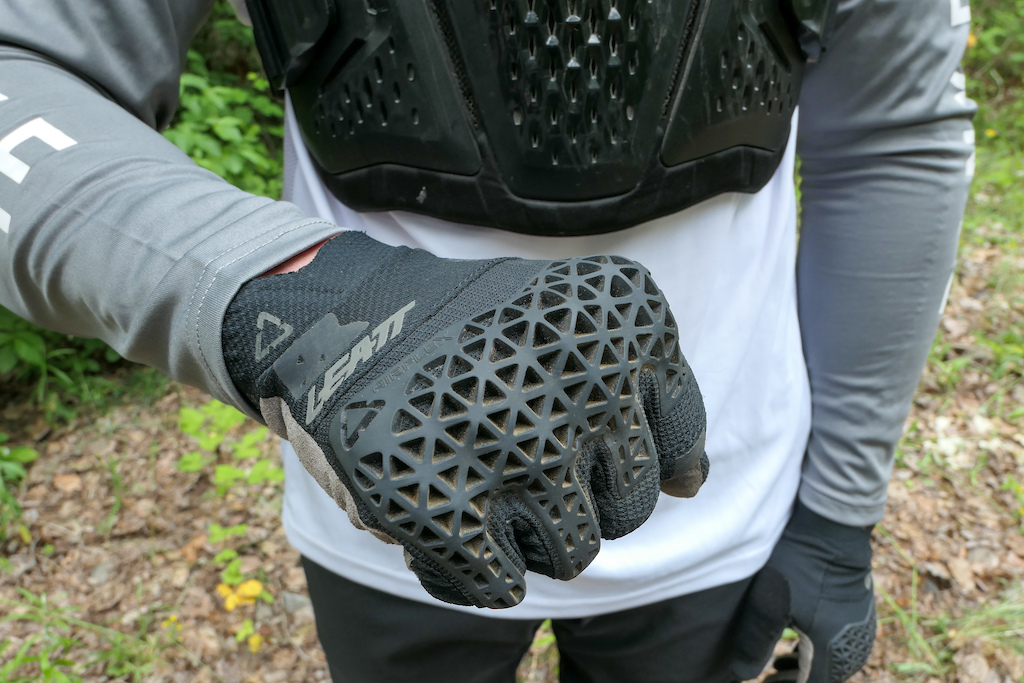
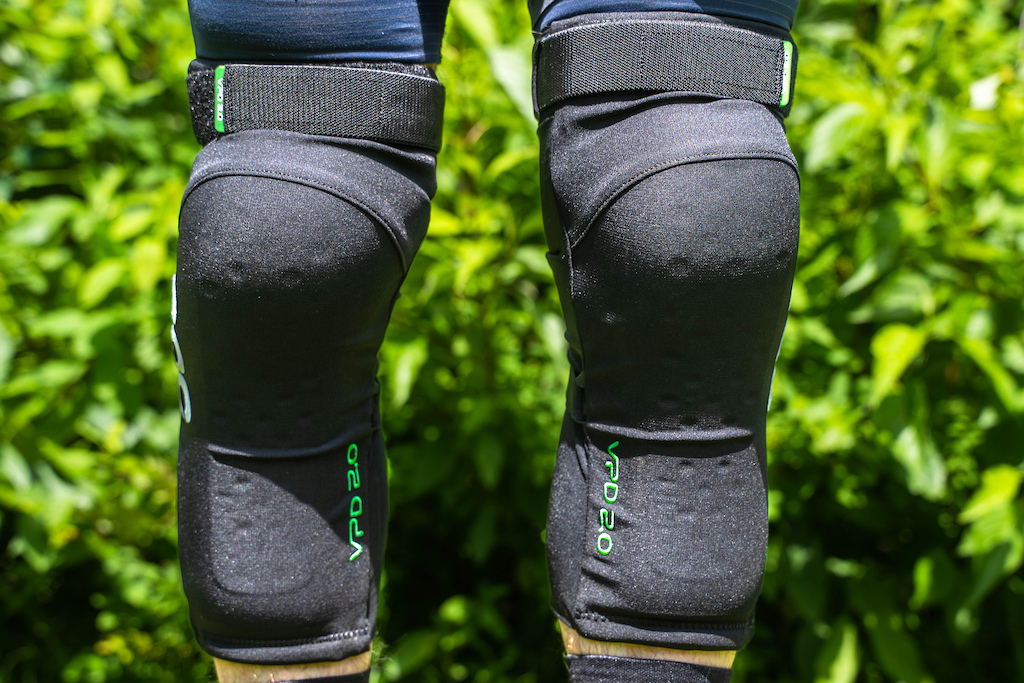
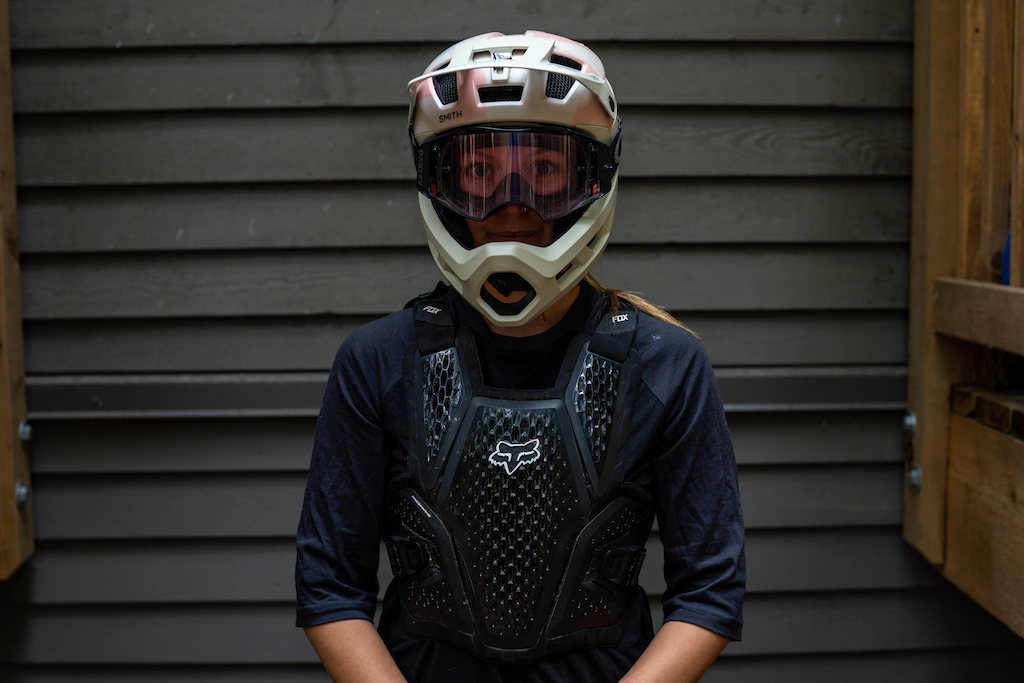
Position: Content Manager, potato enthusiast
Favourite type of trail: Awkward and lumpy.
Chosen Protection (USD): Smith Mainline Helmet ($310 USD), Oakley Airbrake Goggles ($220 USD), Fox Raceframe Impact D3O Back Chest Guard ($189.95 USD) POC Joint VPD System Knee Pads ($175 USD), POC Joint VPD System Elbow pads ($150 USD), Wild Rye Galena Gel Gloves ($38 USD)
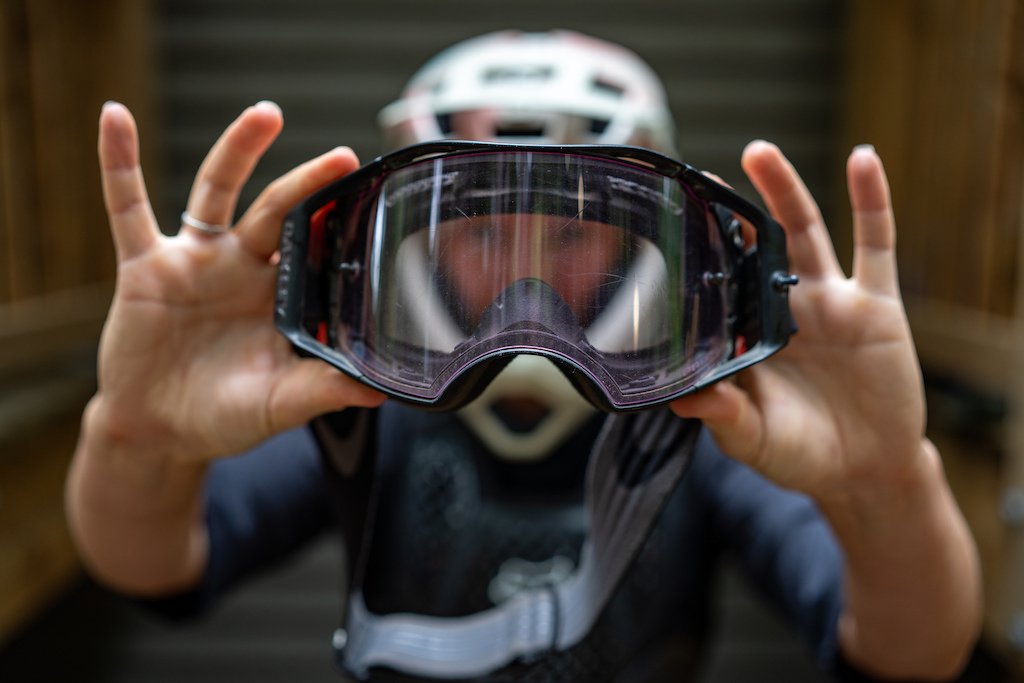
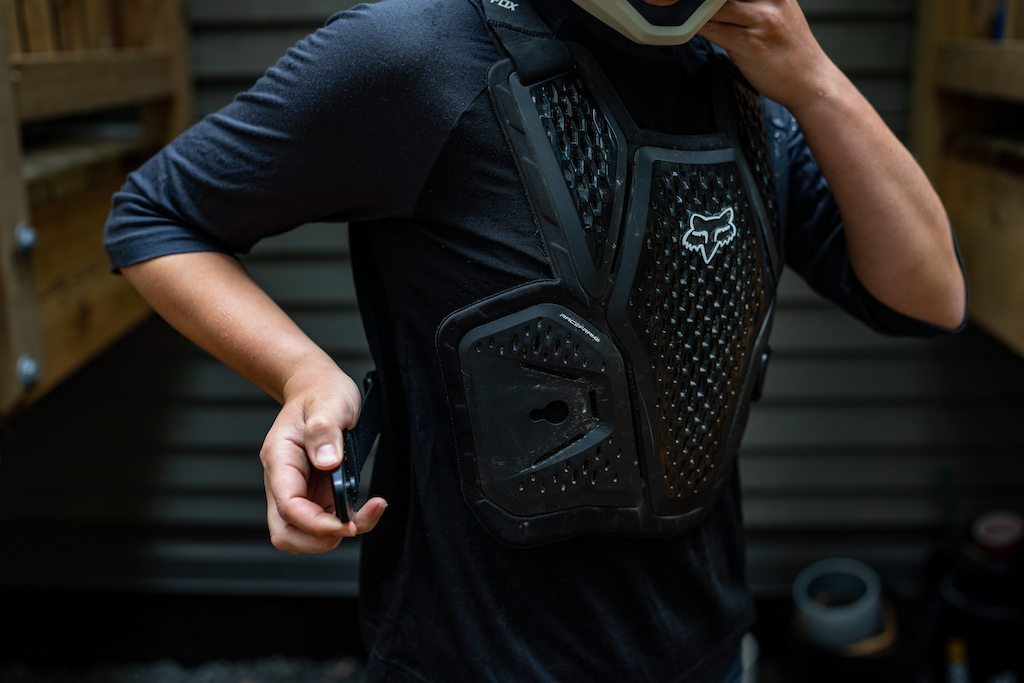
After a couple too many handlebars to the chest, I don’t ride the bike park much without a chest protector – especially at anything high speed. The Fox Raceframe Impact D3O Back Chest Guard was the only one I could get my hands on when I decided to pull the trigger during Covid, and I’ve been really happy with it. Like Matt says above, it’ll go some way in protecting your squishy important insides from rogue rocks and branches, and once I have it on I barely notice.
I’m a little hot and cold with gloves – sometimes I can’t imagine riding without them, and other times I find I have better braking control with them on. If nothing else, they’re good blister protection. When I am wearing gloves, I’m usually wearing the Wild Rye Galenas. They’re super comfy and I can identify them easily amongst our gross pile of bike stuff in the mud room.
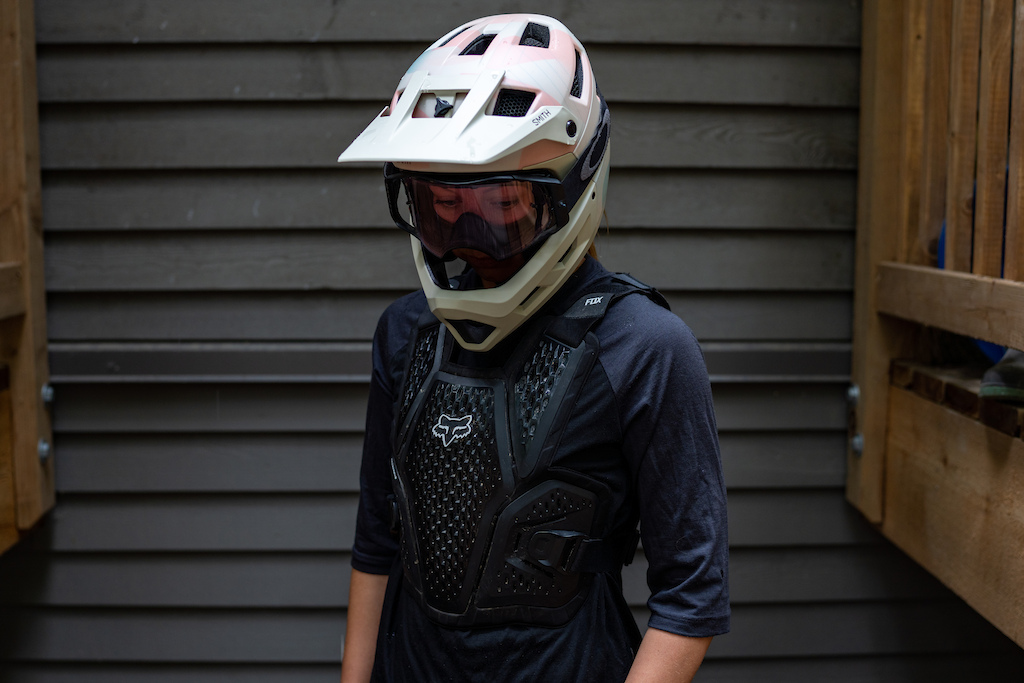
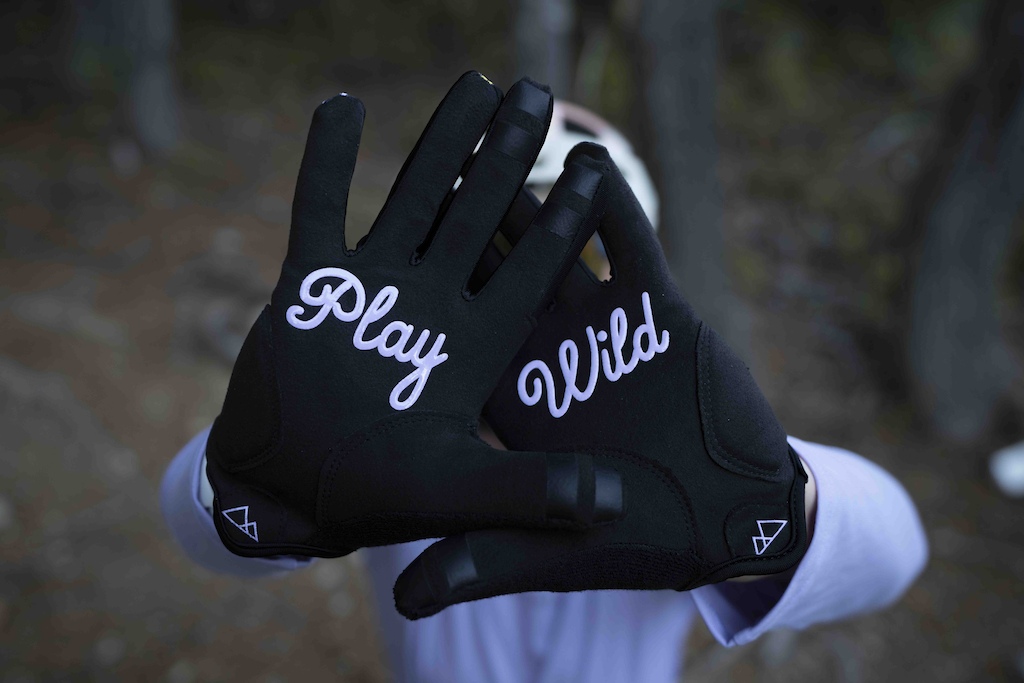
To be honest, I’ve only ever owned my POC VPD Joint System for elbows (again, a Crankworx special from 2021) – but they work great. I don’t tend to wear them when I’m trail riding anymore, but I probably should. They get a little hot under the silicone on the super warm days but it’s worth it considering how many times I’ve scraped the skin off the rest of my arms. For the knees – the VPD Joint System are thickset but comfortable, they slide on nicely under my riding pants without leaving me feeling restricted or chafing. I’m not scrambling to pull them off after my evening laps, and I feel the tradeoff is pretty good. For trail riding, I’m currently testing some lightweight alternatives I’m really stoked on.
I know that the Smith Mainline is targeted mostly at enduro riding, and isn’t the perfect helmet for smashing laps of A-Line four nights a week. But because I don’t ride particularly high speed jump trails (I just really enjoy spending all night scratching my chin, cross-eyed, picking apart tech lines), and can probably count my total summer days in the bike park on two hands and two feet, it works for me. I do feel it’s a great option for both in and out of the park, and it delivers excellent breathability and solid protection. Plus, I don’t have room on the shelf for another, bike park specific helmet.
I’ve recently been testing the Leatt Gravity 4.0 MTB Pant which are pretty slick, and add a nice extra layer of protection in the bike park. On my feet, I only really get along with Fiveten Freerider Pros. I’m currently learning to ride clips (pray for me).
